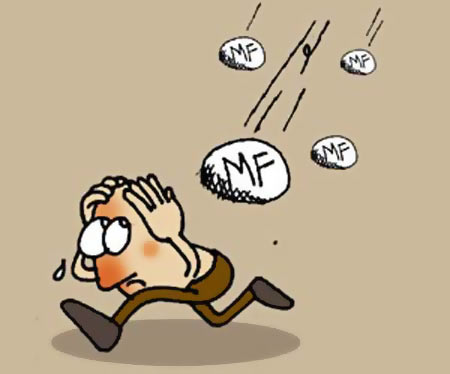 | « Back to article | Print this article |
When should you EXIT your MF investment? 5 POINTERS
Should you exit if your mutual fund has had a manager change? Ask these five questionsto help you decide.
If you own a fund that has recently had a manager change, the good news is that you can take your time to size up the situation; the value of the fund's basket of holdings won't be affected overnight. That stands in contrast with publicly traded stocks, where the departure of a high-profile CEO has the potential to shake up the share price immediately.
Thus, the first piece of advice to investors in this situation is to take time to evaluate the implications of the manager change -- for the fund's positioning, performance, and its role in your portfolio.
The following questions will help you frame your thinking.
When should you EXIT your MF investment? 5 POINTERS
1. How active was the fund manager?
It almost goes without saying that index-fund holders shouldn't be unduly upset if their manager leaves: Although there are certainly some intricacies to properly tracking a market benchmark, there haven't been many instances when index funds have gone dramatically awry.
And even if a fund has an active strategy, a manager change shouldn't be a huge cause for concern if that strategy is highly mechanistic.
A fund that looks for companies that have had returns on equity of 15 per cent or better for the past 10 years is going to have a limited investment universe to choose from and turnover is likely to be minuscule. Thus, in this case, the departure of a manager shouldn't have too disruptive an impact on the fund.
If the fund employs a highly-active strategy, a manager change merits more scrutiny than is the case with a fund that is less active in its approach.
When should you EXIT your MF investment? 5 POINTERS
2. How big is the change?
The next question to ask is how big the change really is. Is one manager leaving a fund that is run by a large and established team? Or is one solo manager handing the baton to another manager who will run the fund individually?
While critics assail multi-manager vehicles as being subject to mediocrity and group think, it's safe to say that manager changes are less of a big deal for them than is the case for solo-run funds.
Check if the successor has worked alongside the departing manager for a while and will he be able to run it solo after taking over?
When should you EXIT your MF investment? 5 POINTERS
3. What do you know about the new person?
Assuming the new manager will be running the fund solo or will be one of just a few managers, the next question to ask is how much you know about him or her. Does previous experience on another fund provide any clues about the new manager's investment style and, in turn, the implications for performance?
Unfortunately, it's not all that common for a manager's past track record to be directly applicable to the new charge: The previous fund's mandate may have been somewhat different than that of the new fund, or the manager may have worked alongside co-managers in previous stints, thereby making it difficult to draw conclusions about his style and abilities.
There's also the unreliability of past performance to bear in mind: Unless a manager has an observable track record over several market cycles, it's a mistake to take too much comfort from a past record, even if it's a good one.
When should you EXIT your MF investment? 5 POINTERS
4. How good is the firm as a steward?
Management and stewardship are intimately related, and the intersection between the two is on full display when there's a manager change. While it's never happy news when a firm loses a successful or long-tenured manager, the best firms lay the groundwork for that possibility, which can help ease the transition.
For example, in the United States, even though all T Rowe Price funds have individual managers, they also have small investment committees that know the funds' positioning well. That helps smooth transitions on the rare occasions when the firm has experienced manager changes.
Firms that are good stewards also do a good job of communicating with their shareholders along the way -- when possible, they let fund holders know who's taking over and when.
When should you EXIT your MF investment? 5 POINTERS
5. Will the fund still be a fit for you?
Let's say you've been able to discern differences in the new manager's approach relative to the old skipper's -- either by analysing positioning on other charges or by observing a change in the complexion of your fund since the new manager took over.
If that's the case, your next step is to consider whether the fund will still work in the role you purchased it to fill. For example, say you originally bought a fund because you wanted large-cap growth exposure to counterbalance your deep-value holdings.
If the new manager has a history of buying stocks that are more blend than they are pure growth, and the new fund's mandate gives him or her a bit of wiggle room, the strategic change may be significant enough to warrant kicking it out of your portfolio.






